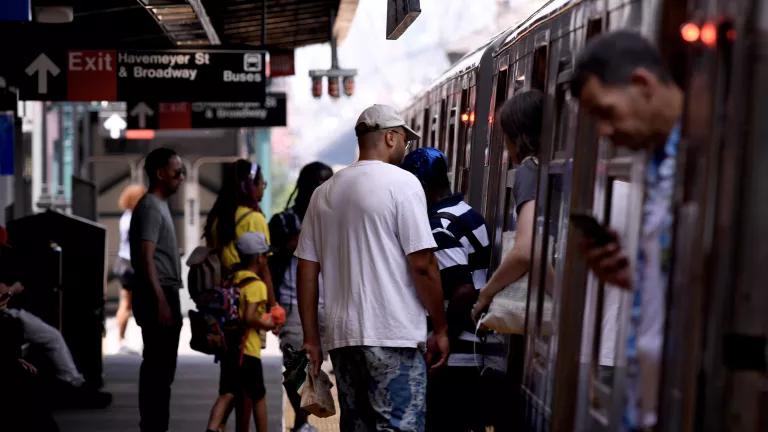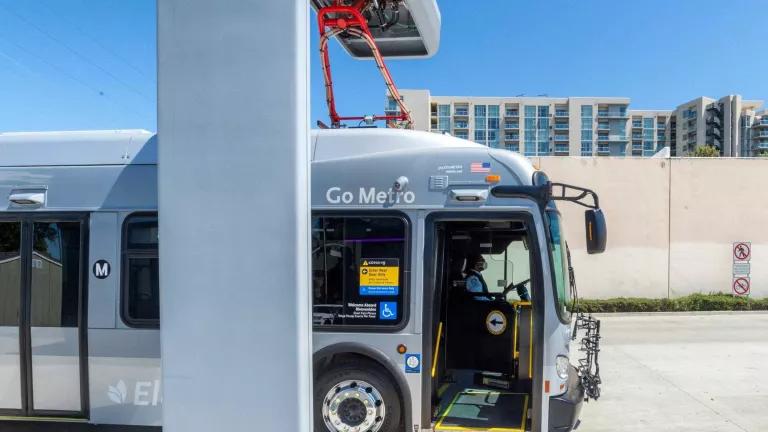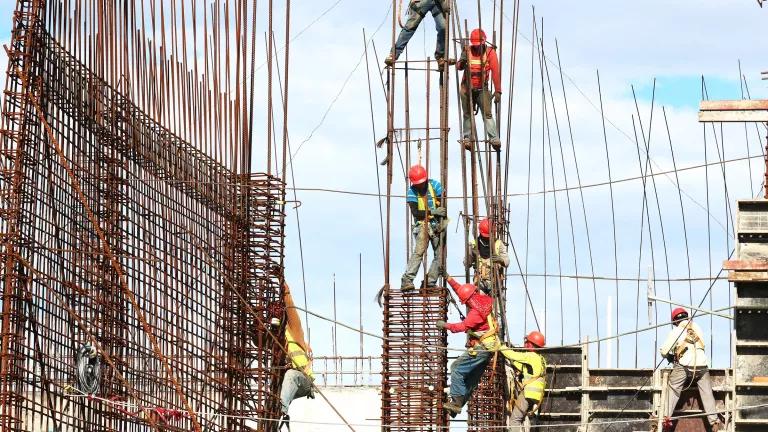The INVEST in America Act: A Transformative Package of Strategic Investment in Climate Action and Equitable Recovery
Our transportation system—the lifeblood of our economy—directly impacts the quality of our lives, and the life of the nation, every day and in every community. It’s time to move forward.

The TriMet MAX light rail, which connects Hillsboro with Portland city center in Oregon
When the nation set out decades ago to build the interstate highways, we weren’t just pouring concrete. Leaders in Washington, D.C., drew on a grand strategic vision to reimagine the very map of American possibility around a vast new system of roadways to match the boundless ambitions of a restless and growing nation.
The result: an entirely new way of driving that changed the country, knitting urban and rural communities together in a web of modern motorways that made travel safer, commerce more efficient, and the economic and cultural life of the nation more vibrant.
It’s hard to imagine the country today without our interstate highway system—and the visionary leadership that built it.
This week, leaders of comparable foresight laid out an equally ambitious vision for our future when the House Committee on Transportation and Infrastructure passed the INVEST in America Act, a transformative package of strategic investment—$548 billion over the next five years—directed to help:
- rebuild our aging roads, rail lines, bridges, and ports
- expand access to sustainable passenger rail and public transit services
- accelerate the shift to electric vehicles
- reconnect disadvantaged neighborhoods fragmented by misguided highway construction in the past
- reduce fossil fuel consumption in the transportation sector that accounts for nearly 35 percent of the nation’s carbon footprint
Much as the interstate highway system has delivered lasting benefits to the country, advancing these vital national priorities will help to strengthen our economy, make our workers and businesses more competitive, and build healthier and more equitable communities.
The INVEST in America Act sets us on course for real progress. It should be passed, in its entirety, by the full House and Senate. It’s an essential down payment on President Biden’s American Jobs Plan, wedding climate action to equitable recovery at a time when the country needs both.
The climate crisis is inflicting rising costs and mounting dangers on our families and communities. And the economy is struggling to rebound from a year of pandemic disruption, with 9.3 million Americans still out of work.
The American Jobs Plan will help us cut the carbon pollution that’s driving the climate crisis, in a way that will create millions of good-paying jobs through, for example, investments and standards to help clean up our dirty power plants, cap abandoned oil and gas wells, and replace aging lead pipes that put millions of families at risk of contaminated drinking water.
And, of course, Biden’s plan calls for transforming our transportation system. That’s what the INVEST in America Act is all about. It starts by centering climate action in national decision-making about the future of transportation in America.
That’s important.
We must cut the dangerous carbon pollution that comes from burning fossil fuels in half by 2030 and stop adding it to the atmosphere altogether by 2050 to avert the worst of rising seas, widening deserts, collapsing species, and raging wildfires, floods, and storms.
Passing the INVEST Act is one of the single-most important steps that Congress can take to help. Transportation is our largest source of carbon pollution, accounting for about 35 percent of the country’s carbon footprint. Of that, about 57 percent comes from cars, light trucks, and SUVs, which put about 20 pounds of carbon pollution in the air for every gallon of gasoline they burn.
We can cut that pollution, and the INVEST Act will help us get the job done while modernizing our transportation infrastructure in ways that will strengthen our economy and make our communities more equitable.
Aging bridges, roads, and ports are dangerous and inefficient, causing costly congestion, slowing personal travel and commercial shipments, and raising costs for businesses and consumers alike.
The INVEST legislation directs $343 billion to the states to help repair and upgrade these critical assets. House Republicans and Democrats worked together to identify nearly 1,500 specific projects nationwide, improving safety, convenience, and efficiency at the community and regional levels.
The measure calls for $109 billion to strengthen public transit systems and provide a wider array of sustainable options for people in urban, suburban, and rural communities. That means affordable ways for people to go to work, shop, or get medical help, using transit options that cut the kind of pollution that can aggravate asthma, bronchitis, and other ills.
The INVEST in America Act triples funding to $32 billion to improve Amtrak’s National Railroad Passenger line, with a stress on upgrading service in both high-traffic corridors and rural communities. It promotes the shift to electric cars and trucks, with $4 billion in investment to build charging stations nationwide and another $4 billion to help localities buy electric buses.
The measure includes $3 billion to help reconnect historically underserved neighborhoods that have been divided by highway construction as part of the larger environmental injustice inflicted for far too long on low-income communities and people of color. And it provides $6.25 million to help states protect critical infrastructure from the kinds of storms, floods, and wildfires that climate change is making more devastating.
Transportation is the lifeblood of our economy. The quality of our highways, bridges, roads, and ports directly impacts the quality of our lives, and the life of the nation, every day and in every community.
We’re not just pouring concrete here. We’re rising to a new generation of American ambition. We’re raising the stakes for our future. And we’re doing it in a way that drives the strong, durable, and equitable recovery we need by confronting the central environmental challenge of our time.



